
Google recently held an event in which they invited a small group of website owners who had been impacted strongly by the helpful content system.
I’ll recap some of the great blog posts and tweet threads written about this. Then, I’d like to think upon what we can learn from what Google representatives said.
The helpful content system started off as a machine learning system that learned from seeing examples of helpful and unhelpful results. Google’s systems have evolved to now be able to use a multitude of signals to predict which content a searcher is likely to find helpful.
I’ll end with thoughts on what to do if you have been impacted. While I do think some sites can recover, I think that most that were strongly affected are not likely to see significant improvement. I know this is disheartening. I know so many good, hardworking people who are stuck after being impacted by this update and do not know what to do. You are not alone. In fact, the whole world is changing as AI advances and changes how knowledge is shared.
But first, let me say a word about Google.
I am not happy with how Google handled HCU
I understand the need for the helpful content system. Overall, I think it was good for the web. The vast majority of sites impacted were sites created just to make money rather than to truly inform and help an audience. However, some honestly good people and sites have had their livelihoods crushed at the hands of recent Google updates. And as we will see in this article, Google doesn’t know how to fix that.
I’ll end this article with thoughts on how to decide whether to continue if you’ve been impacted by the helpful content system. I wish Google would publish something to help site owners understand where Search is headed and why HCU had to happen.
As I write this, ChatGPT has just released its search engine. The way people search for information on the web is changing which means that traditional ****** of how money is made on the internet is changing as well. We are in the midst of significant change in how knowledge is shared.
Observations from attendees
Several of the attendees said that they were told their content was good, but Google’s systems could not detect that. It was discouraging to hear that there was little hope given for recovery any time soon.
I drank the Kool-Aid at the 2024 Google Web Creator Summit – Mike Hardaker
- Mike grossed $250K last year. This year he’s eating at the food bank and barely getting by.
- Danny Sullivan told him, “my content was not the issue.”
- Pandu Nayak, “I suspect there is a lot of great content you guys are creating that we are not surfacing to our users, but I can’t give you any guarantees unfortunately. We are focused on things for our users, that is not going to change.”
- Danny Sullivan: “The whole format of search results has changed.”
- In regards to Forbes, “Google’s signals can be better at figuring out topical authority type stuff which they are struggling to do at the moment.” I think this is interesting considering the blog post I just wrote, looking at how Forbes has lost keyword rankings to some real topic experts.
I attended Google’s creator conversation event and it turned into a funeral – Joshua Tyler
- Danny said there was nothing wrong with their sites.
- There is no sitewide classifier. Individual pages are assessed on the page level.
Kim Snaith
- They weren’t given any answers.
- Danny: “There’s nothing wrong with your sites, it’s us.”
- Someone asked Danny what he’d do if he had a website hit by HCU and he said, “I’d do something else in the meantime.”
Morgan
- Googlers denied there was a problem and are clueless as to how to fix it.
- She said, “If you were hit by HCU do not expect a recovery anytime soon.” “Move on.”
- An update is coming “very soon”. Don’t expect recovery though until perhaps a few updates from now.
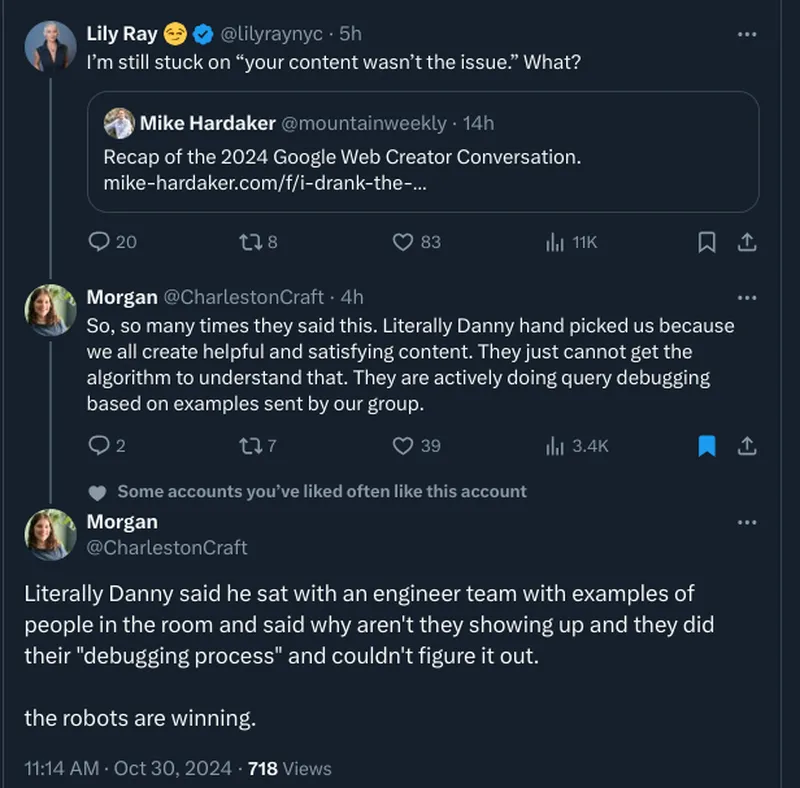
What can we learn from all of this?
Google invited these creators because they had good sites. This is why they were invited – so Google could learn from them and possibly improve at recognizing more types of helpful content.
So why were they impacted so strongly by HCU? And why does Google say not to expect recovery any time soon?
Here is the part I found most interesting:
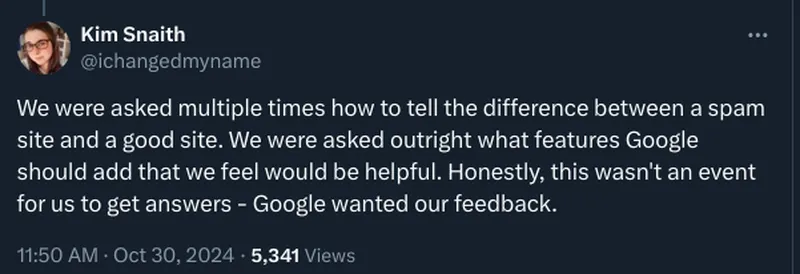
Google asked several times for ideas on how they could distinguish between a spam site and a good site. That’s interesting.
The helpful content system was a machine learning system
We know that the helpful content system was a machine learning (AI) system. Machine learning systems are trained by seeing good examples and bad examples. They then work to figure out the characteristics they can consider and how much weight to give them so as to predict whether an unseen example is a good one or a bad one. In this case, the examples are of helpful and unhelpful results.
We know of one source of these examples of helpful and unhelpful results – the quality raters. This is in the rater guidelines:

The Douglas Oard testimony from the DOJ vs Google trial tells us about another source – live experiments.

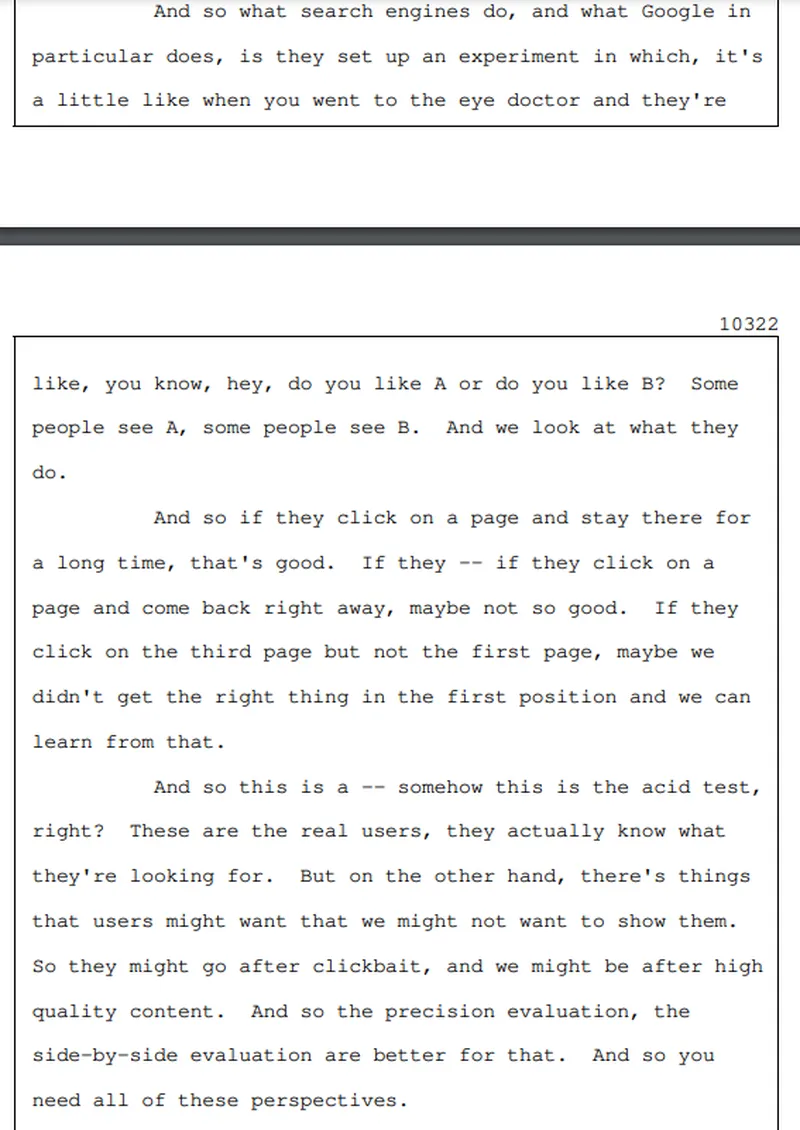
Google can learn a lot about what types of pages searchers find helpful by studying what people choose to click on and engage with. These sites are more likely to be helpful than unhelpful.
If your site was impacted by the original helpful content system it means that it aligns more with the examples of unhelpful content than those deemed helpful.
There’s a new system now
Google’s systems have changed since the original helpful content system was in place. The original documentation Google published with the March 2024 core update tells us that the core systems now use a variety of signals and systems to understand the helpfulness of individual pages.
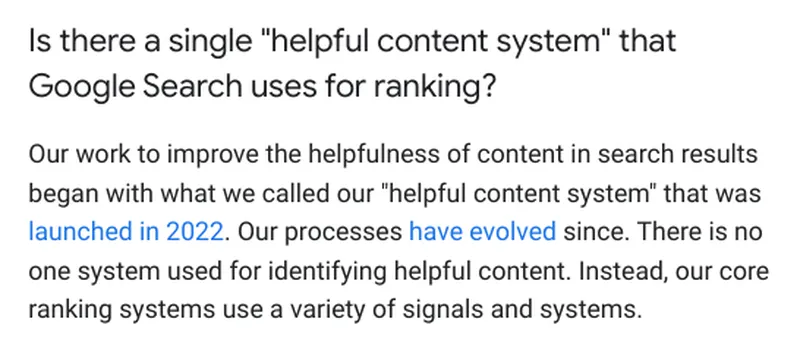
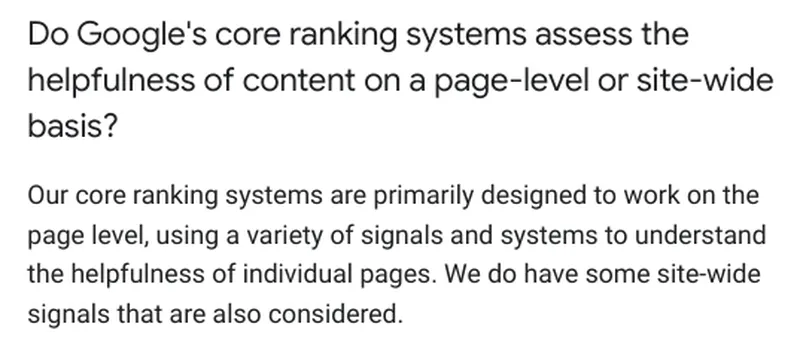
I strongly suspect that user data and quality rater input were initially heavily used with the original helpful content system from 2022 until early 2024. Over those two years, the systems learned by looking at example after example, provided either by quality rater ratings, or live experiments monitoring user clicks, to predict whether content is likely to be helpful or not.
Again in the Oard testimony we have an example that shows how user data can become less necessary as AI capabilities improve.
They spoke of how in the early days Google used user input to learn spelling correction.
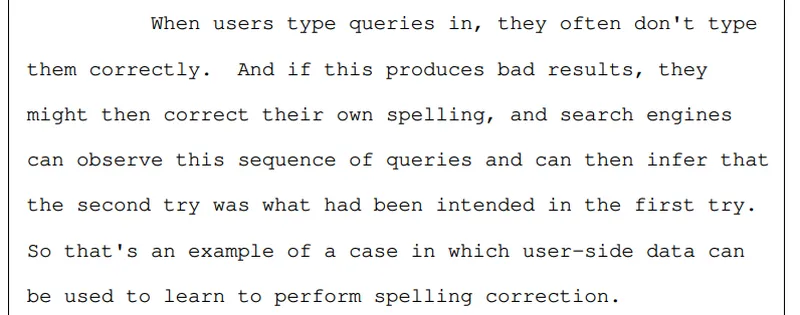
The summary judgment of the trial tells us how eventually AI made it less necessary to use user data.
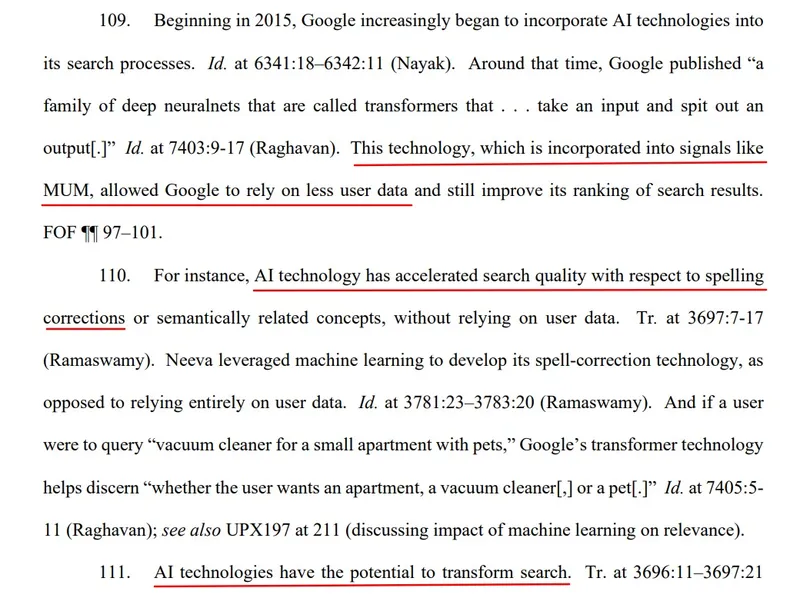
I believe that starting with the March 2024 core update, Google shifted so that their AI systems could use far more on-site signals than user signals to predict which content was likely to be helpful and which would not. After two years of experimenting with the helpful content system, the AI systems had learned a lot about the characteristics consistent with helpful and unhelpful sites and could do most of the work themselves.
As Google announced, the March core update marked an evolution in how they identify the helpfulness of content.
The unfortunate thing is that the system is not perfect. Some decent sites were unfairly classified by this system as unhelpful, with devastating consequences.
What signals align with (un)helpfulness?
We have no way of knowing exactly which signals are measured and how much weight is given to them. I doubt that any human working for Google even knows.
Here are some thoughts, based on many years of studying sites deemed as low quality by Google’s systems. These are some characteristics that I think align with unhelpfulness. If you are indeed still working on trying to recover, perhaps these will help.
Is it difficult for the searcher to find the thing they came to your page to read?
Don’t make your readers scroll past endless fluff and unnecessary words. Put the part that meets user intent high up in your content. Or at least give the reader something in the early text to make them feel that they’ve landed in a place where they’re going to get their needs met. Use headings to help them skim and navigate.
Many sites impacted by HCU made the reader scroll through several pages worth of fluff in order to get to the part that they’re interested in.
Do you rely too much on People Also Ask research?
While it’s good to include related questions in your content, if the majority of your content is answering the PAA questions, you’re likely rewriting content that Google already knows about.
This type of content used to perform well before HCU because it looked good to vector search relevancy systems. But this type of content often contains loads of information real people tend to skip over.
Which leads me to the next point.
Do you have original and insightful information?
Here’s an exercise to try. Search for a keyword your page should rank for. Think of what the searcher is trying to find or accomplish. Look at the first 5 results and jot down 3-5 things a searcher would learn that would help meet their intent. Now open up your page and start reading from the top. How far do you have to read before you get to something interesting and important that hasn’t already been covered?
Are you using too many ads?
It’s totally ok to have ads on your site. But we need to remember that users don’t like intrusive ads. Big brands can often get away with more ad annoyingness than small players. If your ads make searchers click away, this can send similar signals to Google as sites that are made solely to make money.
Are you lacking in appropriate expertise / experience?
This is especially true for informational content. Here’s another test you can do. Search a keyword you want to rank for and look at the experience of the sites Google is ranking. If you are ranking behind sites belonging to a real life store, a credentialled expert or well known authoritative sites, it is going to be difficult to outrank them unless you can produce content people truly want to read even if they’ve already seen those results.
Do you have an audience outside of search?
Google stresses the need for having “people-first” content. The systems seem to show preference to brands that people recognize. The rater guidelines talk extensively about reputation and about being known and recommended by others. If you are not sure whether this is an issue for you, I’d recommend reading the guidelines and looking at every place they mention “reputation” and “known for”.
or…it’s possible that…
There’s nothing specifically wrong with your content
It may be that you’ve got good content, but Google’s systems have not evolved enough yet to correctly determine that. You may have decent content but not content that truly stands out amongst the sites you are competing against. I know that’s frustrating. My heart goes out to the many business owners who have been crushed by these changes. There is a change Google will improve. But it sounds like it will not be any time soon.
Is recovery possible?
A few of the creators who went to the summit expressed hope that they could eventually recover. But the general sense was that they likely will not.

It does sound like Google will be improving the system. But if they do, it is unlikely to help in the short term.

It is possible to recover. Here’s one example of a site that made a recovery after a September HCU hit.
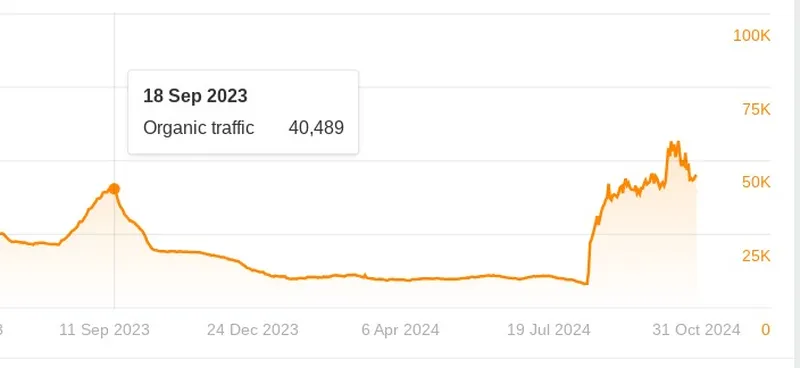
This is not a client, but they have been a newsletter subscriber for years. Looking at the old version of their site I can see they made drastic changes:
- entirely new much more modern site design
- comprehensive and incredibly helpful buying guides
- great use of headings to guide the user
- meeting user intent at the top of the page
- unique imagery showing real people actually using the product they review
- helpful high quality videos
Here is another, although it’s debatable whether the site was impacted by HCU or perhaps it was the previous August core update. Their GSC data shows a distinctive dip starting September 14, 2023 so I do believe the helpful content system impacted them. These folks were clients years ago. I can’t take credit for the improvements they made, but I do know they read my thoughts in my newsletter and work hard to make a helpful site.
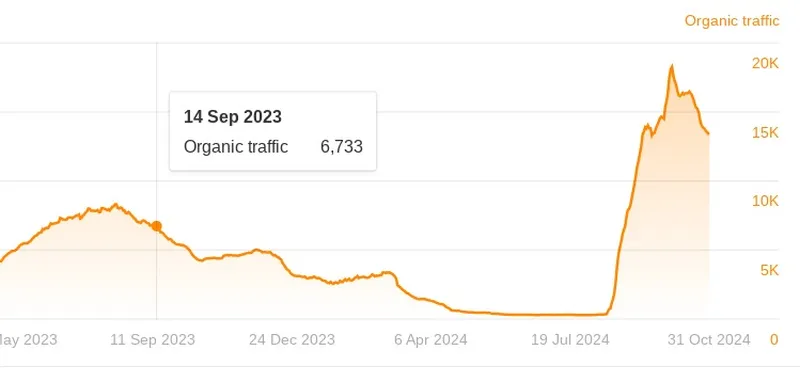
They added new pages that really did a good job at answering the main questions their audience has. It should be noted that they serve a very specific audience. They’re not just writing content to rank in search, but rather they are truly helping people in their industry. They also added quizzes that really help the user answer the question they came to the site to find.
I show these to say that it is possible to recover. However, sadly, the vast majority of the hundreds of sites that I have seen that have been impacted by HCU have either seen no signs of recovery or show a pattern like this where the August core update started to help and then the site started to decline again.
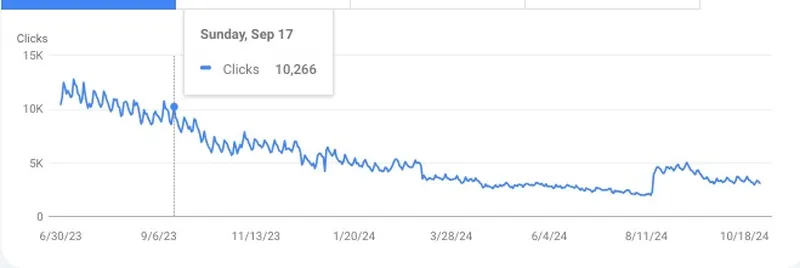
Should you keep going and working for a recovery?
Here are a few questions to consider that may help.
1) How much of your previous success came from knowing SEO? If SEO was your driver, you may find that old tactics no longer work.
2) How truly original and insightful is your content? Do you have competition? Can you be substantially better than them?
3) Do you have an audience outside of search? If not, you can work towards becoming a brand – getting your name out there, doing podcasts and interviews and more. If that’s not something you want to do, recovery may be difficult.
4) As AI answers and language ****** tools like ChatGPT and Gemini are getting better at answering questions, are you able to create a resource that people truly will seek out even with these tools available?
Here is a GPT I made that you can use to brainstorm with ChatGPT about whether recovery is possible. It has a bunch of my advice and more in the knowledge base. Of course, I wouldn’t rely solidly on this tool…but brainstorming with it may help you work things out.
Search is changing. The world is changing.
Search really is changing rapidly. I believe that the HCU impacted sites are the start of significant civilization level change. We are already seeing news publishers closing down. Many businesses that rely heavily on organic search are struggling.
My husband has a saying. I didn’t like it at first, but I’m starting to get it now: “It’s happening for you, not to you.” For many of you who are reading this, I believe that it may be time to look for other ways to use your talents and skills. There will soon be incredible demand for people who understand how LLM tools like ChatGPT and Gemini work. This is why I created a new site designed to help people learn more about AI. Or perhaps there is another path waiting for you.
In the year 1900, 41% of the workforce was employed in agriculture. The industrial revolution changed that. We are at the start of a new revolution as AI changes how we live.
If you do decide to continue to improve your site, you likely will need to go through a couple of significant Google updates before the systems recognize your hard work.
I’d like to say thank you to those creators who took the time to speak with Google. Creators are incredible people and I have great hope for your future.
Marie



